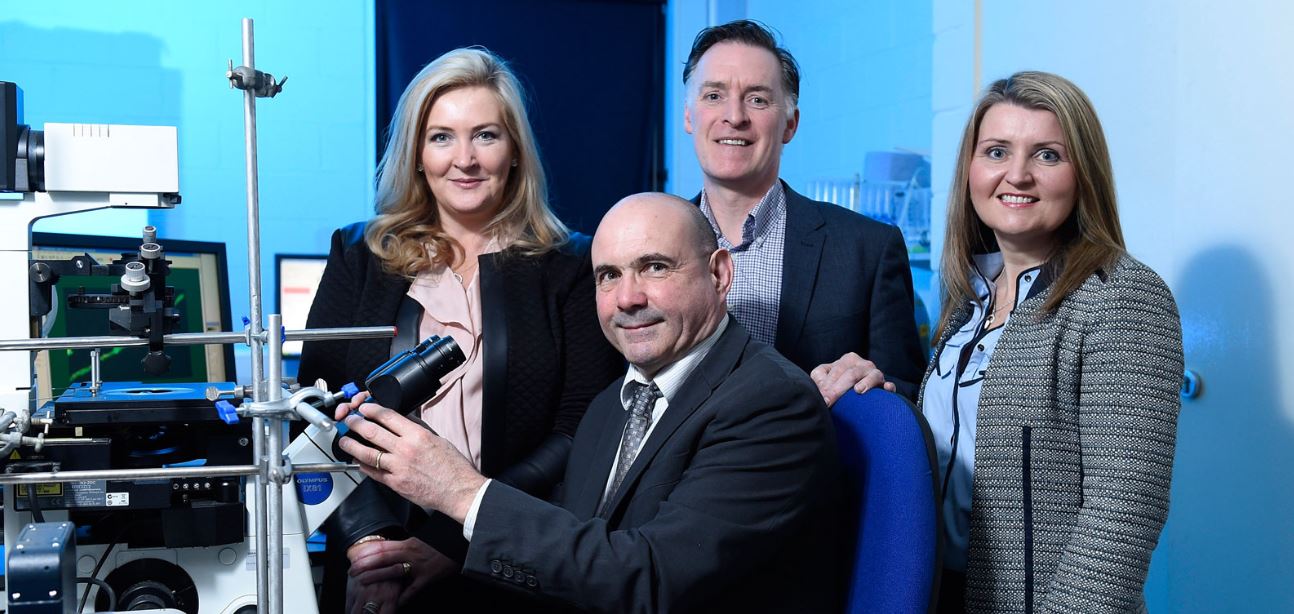QUEEN'S SECURES EU FUNDING FOR FIGHT AGAINST LUNG DISEASE 
26 January 2017
Queen’s University has secured €2.4m funding under the European Union’s INTERREG VA Programme for a pioneering cross-border research project, designed to better understand and alleviate the impact of lung disease.
In total, €7.7m has been offered to the Dundalk Institute of Technology (DkIT), in partnership with Queen’s and University of the West of Scotland (UWS), to deliver the ‘BREATH’ (Border and Regions Airways Training Hub) project.
The project will involve a strong cross-border partnership involving the School of Pharmacy and the Centre for Experimental Medicine (CEM) at Queen’s, DkIT’s Smooth Muscle Research Centre (SMRC) and the Institute of Biomedical & Environmental Health Research at UWS.
Commenting on the joint initiative Dr Keith Thornbury (seated), Principal Investigator at the SMRC and BREATH Project Lead, said: “Chronic obstructive pulmonary disease (COPD) is a growing healthcare concern, and is a leading cause of morbidity and mortality worldwide. Its prevalence in the border regions of Ireland poses major social and economic implications for the North-East region. We look forward to leading this project with Queen’s and UWS to help alleviate the detrimental impact of this disease.”
The project will establish a world-class cluster of researchers, involving collaborations between scientists and clinicians, that will help address the causes, treatment and potential prevention of COPD.
COPD is an incurable respiratory condition characterised by progressive airflow reduction, breathing difficulties and irreversible lung damage (emphysema). It significantly impairs quality of life and has a high cost to health services and the wider economy. In 2011 the annual economic burden of COPD across the EU was estimated at approximately €141.4 billion.
COPD-related hospital admission is higher in Ireland than any other developed country and the condition is also particularly prevalent across Scotland and Northern Ireland. In Ayrshire and Dumfries & Galloway COPD-related hospital admission is amongst the highest in the UK and hotspots also occur throughout Northern Ireland, particularly in major urban areas and in the border regions.
Match-funding for the project has been provided by the Department of Jobs, Enterprise and Innovation in Ireland, the Department for the Economy in Northern Ireland and the University of the West of Scotland (UWS).
Dr Lorraine Martin (right) from the School of Pharmacy at Queen’s is leading on the project along with colleagues, Drs Lorcan McGarvey (back/middle) and Fionnuala Lundy from CEM. She explained: “We are delighted to receive this funding to support an ambitious, collaborative research partnership that will address key health challenges in COPD. This disease is frequently under-recognised and under-treated, therefore there is a real need for impact in terms of prevention, treatment and management.
“Through BREATH, we have an opportunity to harness complementary resources and expertise across the partners to enable a greater understanding of disease mechanisms which will facilitate the identification of novel targets and the development of therapeutic interventions.
“At Queen’s we have a motivation to address major health challenges. Innovation and scientific rigour are the cornerstones of Queen’s University’s reputation. We are particularly excited to do this in collaboration with DkIT and UWS and together we aim to deliver high value doctoral and post-doctoral training that will increase our national and international capacity in regard to COPD research. Impact will also be felt in terms of competitiveness for funding and industry engagement,” said Dr Martin.
Dr McGarvey, consultant chest physician and clinical lead for the programme, added: “COPD is a common and progressive lung disease which imposes an enormous healthcare burden worldwide. Over the last 30 years, the progress in treatment has been much less than in conditions such as cardiovascular disease and some forms of cancer.
“One problem is that we still don’t fully understand the underlying mechanisms and as a consequence currently available drugs are not particularly effective at slowing or reversing the disease process. This EU investment brings together scientists and clinicians from the border regions to help resolve some of these knowledge gaps, which in time will lead to better treatments for patients.”
Recognising the importance of the project Gina McIntyre (left), CEO of the Special EU Programmes Body (SEUPB) who is responsible for managing the EU’s INTERREG VA Programme, said: “This EU-funded project will establish a world-class cluster of researchers who, by working in partnership, will make a positive difference to the fight against a debilitating health issue which effects many people living across the UK and Ireland.
“Working on a cross-border basis the project partners will be able to share information and produce data that can help improve the quality of life for people living on both sides of the border. It will also provide excellent development opportunities for a number of PhD students and has strong potential to create spin off benefits for all those involved,” she continued.
Media inquiries to Emma Gallagher, Communications Officer at Queen’s University on +44 (0)28 9097 5384.
Back to Main News
Top of Page